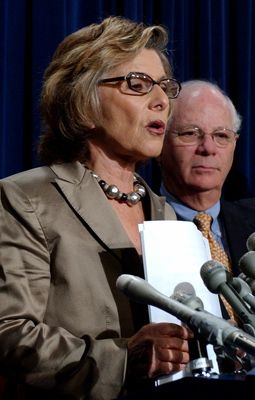House demands updates on war exit strategy
WASHINGTON -- The House last week applied pressure on President Bush to withdraw troops from Iraq, approving legislation to order the Bush administration to report a war exit strategy.
A bill that passed 377-46 would require Bush administration officials to report within 60 days after final passage, and every 90 days after that, on its planning for withdrawal of U.S. forces.
Democrats said the measure was part of a methodical legislative effort to end the war, though it does not mandate a withdrawal. Other war bills are scheduled to be voted on in the House in coming weeks.
The House this year has repeatedly voted to set deadlines to end the war, but the effort has failed in a sharply divided Senate, where Democrats hold a narrow majority.
Supporters said the bipartisan legislation is a step forward to end political bickering over the direction of the war.
Opponents of the war criticized the House bill for not doing more to force Bush to change his war strategy.
The bill sponsored by Reps. John Tanner, D-Tenn., and Neil Abercrombie, D-Hawaii, demands that the Pentagon report on the status of planning for redeployment.
It requests timetables and asks for a report on the number of troops necessary to remain in Iraq to protect U.S. interests.
Reps. Shelley Berkley, D-Nev., Dean Heller, R-Nev., and Jon Porter, R-Nev., voted for the bill.
Meanwhile, the Senate rejected an attempt by Sen. Russ Feingold, D-Wis., to cut off funding for the war by June 30 of next year.
Feingold's proposal would have stopped all funding for the war by summer 2008, except for money to combat terrorism, protect U.S. interests and train Iraqi security forces.
Eliminating the war budget would end what Democrats have criticized as an "open-ended" war strategy.
Feingold argued that, by spending money in Iraq, the government is neglecting Afghanistan and other terrorist havens where violence has increased.
Critics said stopping funding of the war would undercut U.S. forces by depriving them of necessary resources.
It marked the third time this year the legislation supported by Feingold and Senate Majority Leader Harry Reid, D-Nev., failed.
The vote was 68-28.
Sen. John Ensign, R-Nev., voted against the bill. Reid voted for it.
FELONS CAN SERVE
The Senate derailed an attempt to prevent certain convicted felons from entering the military.
Lawmakers voted 53-41 to table an amendment by Sen. Barbara Boxer, D-Calif., to prohibit people convicted of arson, aggravated assault, hate crimes, sexual misconduct or terroristic threatening to enlist.
Existing law allows waivers for convicted felons to join military service.
Boxer said the military in the past few years has drastically increased the number of waivers given to ex-convicts.
She said it's "common sense" to prevent at least some of them from entering the military.
The waiver push is being driven by the military's effort to meet recruiting goals, she said.
Opponents said the waiver system works and at least a study is necessary before Congress places blanket guidelines on the program.
Ensign voted to table the amendment.
Reid voted for it.
CONTRACTOR ACCOUNTABILITY
U.S. contractors working in Iraq and Afghanistan would fall under the jurisdiction of U.S. law in a bill that passed the House, 389-30.
Passage came on the heels of an incident in September, when employees of Blackwater USA were accused by the Iraqi government of killing civilians without provocation. It soon became clear the contractor fell under neither Iraqi nor U.S. law.
"This latest incident unfortunately evidences the fact that some of these contractors are abusing their power with impunity, subject to no law whatsoever, domestic or foreign," said Rep. John Conyers, D-Mich.
The bill would require contractors to receive the same legal treatment as soldiers, who are subject to U.S. military laws. The FBI would conduct investigations of criminal allegations.
The Bush administration opposes the legislation, saying the bill would harm national security.
Berkley, Heller and Porter all voted in favor of the bill.
DEVELOPMENT COMMISSIONS
The House passed a bill allocating $1.25 billion to fund two regional economic development commissions and create three new commissions.
The Delta and Great Plains commissions were reauthorized, while new commissions were created along the Mexican and Canadian borders and in the Southeast.
The vote was largely partisan, with 225 Democrats and 39 Republicans voting for the bill. Voting against it were 154 Republicans.
Rep. James Oberstar, D -Minn., said the commissions are needed because "economic difficulties transcend political boundaries."
President Bush threatened a veto because the bill contained unacceptable wage requirements.
Berkley supported the bill, while Heller and Porter voted against it.


















